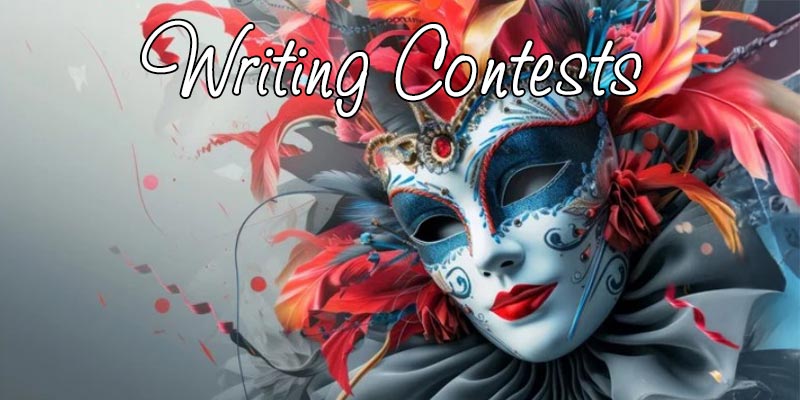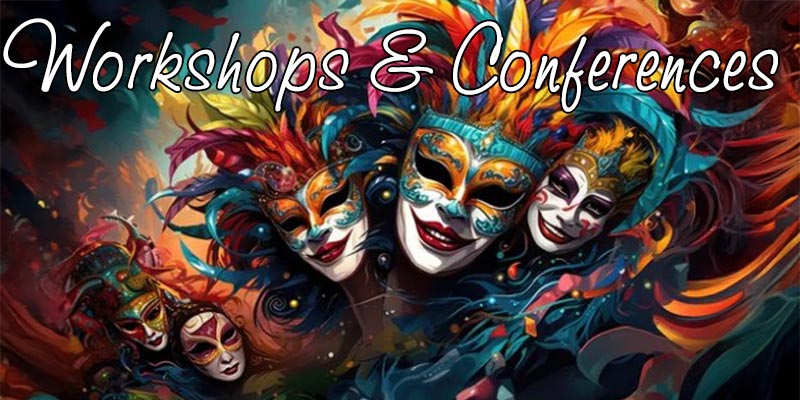
The site for writers of all genre, and the readers who love them. Find what you want to know.
Writing Romantic Comedy

Quick — tell a joke. On paper, in the beginning of a novel. Then hope that a few thousand readers will not only get the joke, but remember you as a funny writer. Then repeat that for the next 400 pages, all while juggling plot, realistic characters and enough conflicts to fill a church. Sound difficult? It is, as anyone who has tried to write comedy will tell you.
There are techniques for writing comedy well, however. Some authors have an ingrained funny bone; others need to learn to pump up the humor. “I will warn you, however, that it ain’t easy being funny,” said Lynn Michaels, author of Mother of the Bride, her latest comedic release from Ivy/Ballantine. “Some days it’s just damned hard work. On those days, having a skewed view of the world can be most helpful.”
Michaels said her husband, Michael, is the source of inspiration for her sense of humor, which has become more a part of her books over the years. “I have a pretty loopy sense of humor, but Michael is a walking-talking study in timing and deadpan delivery. I’ve spent the last almost thirty years with him laughing my butt off.”
Holly Jacobs, who writes for both Silhouette Romance and Harlequin Duets, said she felt her voice lent itself to comedy. “It has to do with word choice and writing structure. My voice seems to have a comedic quality–it just sort of comes out that way.” Jacobs focuses on the humor strengths in her own life by writing books that focus on real-life humor, like children who refuse to behave.
To keep the story lines fresh, and remove the tendency toward slapstick, Jacobs said she will take a new look at her work. “Sometimes, if a scene isn’t working, or the book is sort of languishing at one particular spot, I find that I’ve made a wrong turn. Or, maybe worse, I’ve made a predictable turn. Rather than turning right, which is what you’d expect, I take a sharp left turn. When I do that, I tend to find the story picks back up.”
Pam Hanson, who is half of the mother-daughter writing team Jennifer Drew, said when she teamed up with her mother, who had sold 19 books already, the pair found their combined voice lent itself to comedy. They ended up writing for Duets. Hanson said writing comedy well springs from a number of approaches. “Barbara and I both like to see humor arise from people’s reactions to situations (could be because of some of the situations we’ve found ourselves in!) so one way to punch up the humor is to go back and see how characters react to wacky situations they’re placed in. In our March 2002 Duets Stop the Wedding! the hero and heroine stumble onto an unusual wedding reception, complete with an Elvis cake. Their reaction is where the humor in the scene comes from along with some other antics!”
The number-one requisite for writing comedy is having a sense of humor, said Jacobs. However, authors need to remember that story is the top priority in a book, not chuckles. “Even if you’re writing comedy it’s important to remember to create three-dimensional characters. Though these characters are funny, they tend to take themselves seriously. They have problems, they have goals. They love, they get hurt. If you make your characters too slapstick, your readers won’t be able to identify with them, and if readers can’t do that, then odds are the book isn’t going to work for them.”
Some authors excel at humorous one-liners, others create larger-than-life characters while some work on funny plots. Michaels said her books tend to be situational in humor. “It’s not the characters who are necessarily funny; it’s the situation that they find themselves in. The more irony in the situation — or the set-up, or whatever you want to call it — the more raw material you have to build a comedy.”
However, she added, the focus for her, as with the other authors, is always on the story. “Strong, believable characters are the foundation of any good story, comedy or drama. A cockeyed view of the world your characters live in also helps.”
On days when the funnies refuse to come, Hanson said she and her mother try to relax and wait for inspiration. “Eat M&M’s, check e-mail, shuffle papers on my desk around…and not try to force it!” she advised. “Then try to think what exaggeration of a similar situation could make it funny. If all else fails, eat more M&Ms!”
Jacobs distances herself from comedy when she’s stuck on a scene. She said she reads books that are not humorous, such as historicals or non-fiction. “I don’t know why it works, but it does work for me!”
Michaels said authors should take the pressure off themselves to be too funny. “You don’t have to be laugh-out-loud hilarious on every page. A smile will often times do just as well,” she said. When a scene falls flat, Michaels tries a number of tricks to make it funnier. “Dialogue is an excellent way to punch up humor. Being flip or sarcastic can lighten things up. And description. Find funny ways to describe things. You’ll get a smile even if you don’t get a laugh. Take a look at your scene. Have you got a prop or two lying around you can make use of? I got stuck in a scene like this in the book I’m finishing now. Fortunately, I’d put a hedge apple tree in this scene, so I had my heroine throw hedge apples at her sister’s house to vent her anger. Doesn’t sound particularly funny out of context, does it? But it works in the book to get my character out of a dark and very un-funny moment.”
Learning to write humor can seem like a daunting task, but all the authors interviewed said comedy can be a taught technique. “I really recommend analyzing romantic books and movies to see what works and what doesn’t,” said Hanson. “Look at the pacing of the stories and see where the humor comes in and why. And be wary, if the humor feels forced, it probably is.”
For more information, see Building Humor into Your Romance, by Anne Marble.
Copyright © 2002 Shirley Kawa-Jump
AGENTS & EDITORS
- Agents: Knowing When To Hold One and When To Fold
- Copyright Primer, Know Your Rights
- Getting Offers from Multiple Literary Agents
- Landing An Agent Elements Of A Winning Query
- Literary Agents List
- Preditors and Editors
- Publishing, Writing Terms, Acronyms
- Tips for a Successful Editor Appointment
- Want More? Here’s How to Get It
- What NOT to Do When Beginning Your Novel
- Windup for the (Story) Pitch
- Write the Perfect Book Proposal
CALLS FOR SUBMISSIONS
![]()
CALLS FOR SUBMISSIONS MAIN PAGE
- 2026 FEB Calls for Submissions
- 2026 JAN Calls for Submissions
- 2025 DEC Calls for Submissions
- 2025 NOV Calls for Submissions
- 2025 OCT Calls for Submissions
- 2025 SEP Calls for Submission
- 2025 AUG Calls for Submission
- 2025 JUL Calls for Submission
- 2025 JUN Calls for Submission
- 2025 MAY Calls for Submission
- 2025 APR Calls for Submission
- 2025 MAR Calls for Submission
- 2025 FEB Calls for Submission
CHARACTERIZATION
CONFLICT
DIALOGUE
GRAMMAR & FORMATTING
![]()
GRAMMAR & FORMATTING MAIN PAGE
- Achieving 250 Words / 25 Lines Per Page
- And Sammy, Too? Oh, No!
- Changing Double Hyphens to EM Dashes in Word
- Edit Easier
- High Hopes–Avoiding Common Mistakes
- Misused Words
- Navigating In Your Novel
- Proofreaders Marks
- Research Links
- Rules for Writers
- Slang and Jargon Souces
- Tightening Your Manuscript and Trimming the Word Count
JOBS / MARKETS
- 3 Ways to Make Your Non-Fiction Article Pitch Stand Out
- 35 Online Work Ideas to Earn Good Money Whilst Studying
- An Interview with Holly Ambrose
- Beyond the Basics
- Copyright Primer, Know Your Rights
- Finding Markets Fiction and Nonfiction
- Freelance Writing 101
- Getting Offers from Multiple Literary Agents
- How To Market Your Book After You’ve Written It
- How to Write a Novel Synopsis
- How To Write Your Own Press Releases
- Magazine Links
- Making Money As a Corporate Freelancer
- Market News–All Genres
- Need a Clip? Open a Newspaper
- Newspaper Writing Resources
- Publisher’s Websites
- Selling to Children’s Markets
- Submitting to UK Markets
- Syndication 101
- the Power of the Press
- To Specialize, or Not to Specialize?
- Ultimate Guide to Being a Freelancer 2025 Update
- What Are Your Chances of Getting Published?
- Why Article Writing Should Be A Part Of Your Career Development Strategy
- Why E-Books?
- Write the Perfect Book Proposal
- Write Your Way to $1000 a Month
- Youth Writing Markets
PLOTTING
- 3 Ways to Know When to End Your Chapters
- 7 Excellent Plotting Tips from Agatha Christie
- 7 Ways to Add Great Subplots to Your Novel
- 8 Best Writing Tips to Become a Best Storyteller
- Does Your Plot Need a Subplot?
- Love to Write: Here Is How You Can Build Your Career
- Slang and Jargon Souces
- The All Purpose Plot
- Turning Points and Plot Points in Storytelling
- What NOT to Do When Beginning Your Novel
- Writing the Novel by the Numbers
POINT OF VIEW
QUERIES & PROPOSALS
- Agents: Knowing When To Hold One and When To Fold
- Getting Offers from Multiple Literary Agents
- How to Write a Novel Synopsis
- Landing An Agent Elements Of A Winning Query
- Path to Self-Publishing Success
- Publisher’s Websites
- Publishing, Writing Terms, Acronyms
- Science & Science Fiction Writing Organizations
- Submission Tracking
- Surviving a Book Proposal
- Windup for the (Story) Pitch
- Write the Perfect Book Proposal
- Writing a Synopsis & Query Letter
SUBMISSIONS
- Agents: Knowing When To Hold One and When To Fold
- An Interview with Jack Fisher
- Copyright Primer, Know Your Rights
- EBooks-Fears to Possibilities
- How to Write a Novel Synopsis
- Literary Agents List
- Path to Self-Publishing Success
- Publisher’s Websites
- Publishing, Writing Terms, Acronyms
- Science & Science Fiction Writing Organizations
- Selling to Children’s Markets
- Submission Tracking
- Surviving a Book Proposal
- What Are Your Chances of Getting Published?
- Write Your Way to $1000 a Month
- Writing a Synopsis & Query Letter
- Youth Writing Markets
SYNOPSIS
TIP SHEETS & GUIDELINES
![]()
TIP SHEETS & GUIDELINES MAIN PAGE
- Achieving 250 Words / 25 Lines Per Page
- Changing Double Hyphens to EM Dashes in Word
- Copyright Primer, Know Your Rights
- How To Write Your Own Press Releases
- Knowing and Finding Your Voice
- Plan for Success
- Publisher’s Websites
- Science & Science Fiction Writing Organizations
- What NOT to Do When Beginning Your Novel
- Why E-Books?
- Working with a Critique Group
WORKSHOPS & CONFERENCES
WRITING CONTESTS
![]()
ABOUT WRITING CONTESTS
- A Guide to Assessing Writing Contests
- Writer’s Conferences Do You Really Need To Attend?
- Writing Groups List
- 2026 FEB Writing Contests
- 2026 JAN Writing Contests
- 2025 DEC Writing Contests
- 2025 NOV Writing Contests
- 2025 OCT Writing Contests
- 2025 SEP Writing Contests
- 2025 AUG Writing Contests
- 2025 JUL Writing Contests
- 2025 JUN Writing Contests
- 2025 MAY Writing Contests
- 2025 APR Writing Contests
- 2025 MAR Writing Contests





